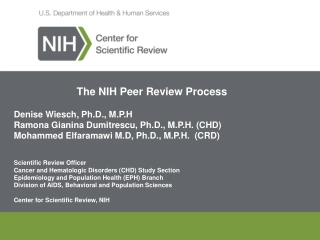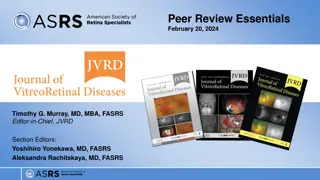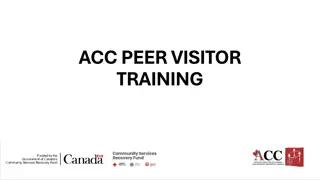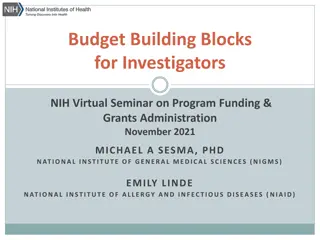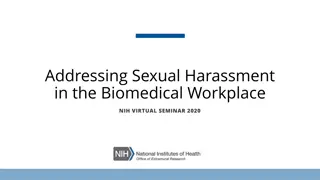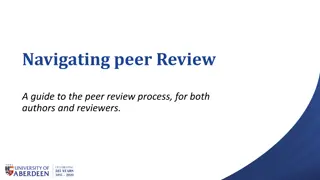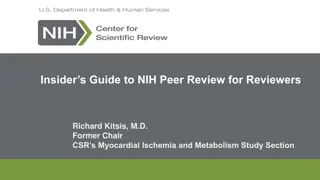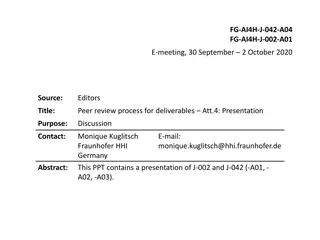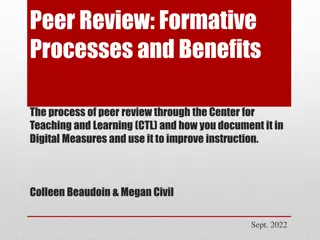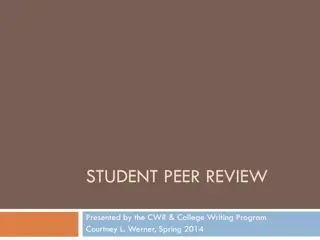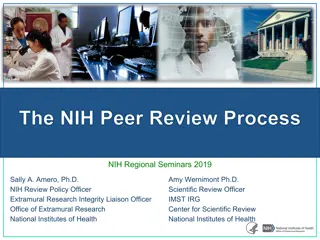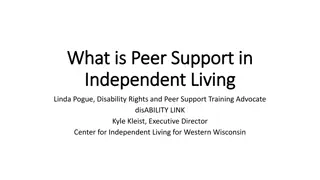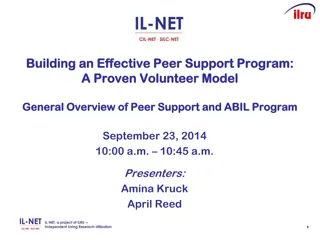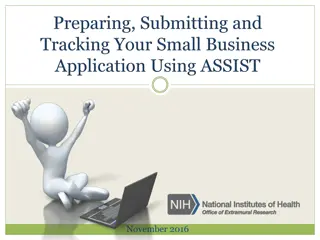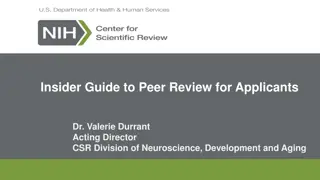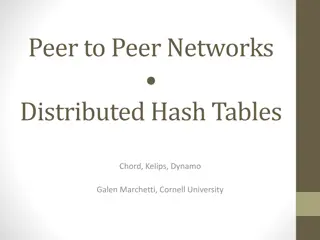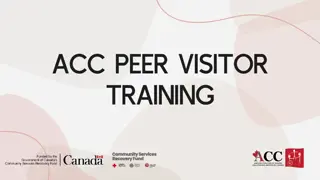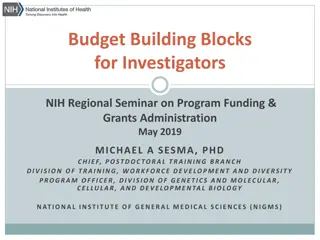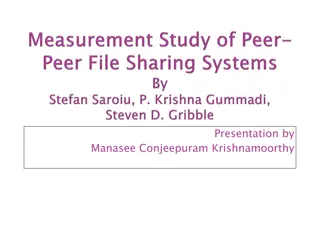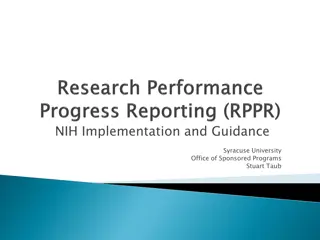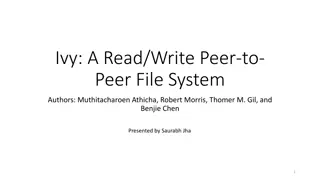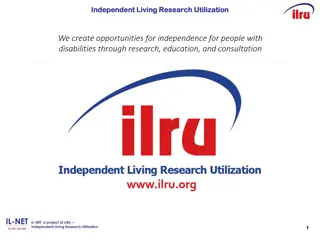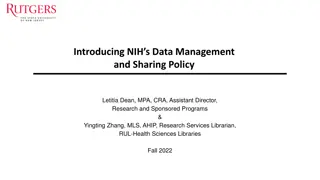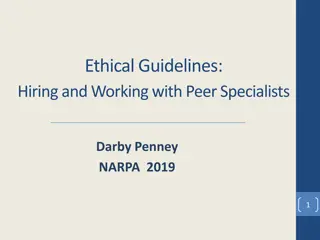The NIH Peer Review Process
The NIH Peer Review Process, including the role of the Center for Scientific Review (CSR) in receiving, referring, and reviewing grant applications. Understand how applications are assigned to institutes or centers and the importance of scientific and technical merit in the review process.
1 views • 18 slides
Simplified Review Framework
Simplified review framework for peer review criteria in research project grants, aimed at improving the evaluation process for peer reviewers. The framework will address concerns raised by the extramural community regarding increased complexity and administrative burden in NIH's peer review criteria
1 views • 20 slides
Peer Review Essentials
Explore the importance of peer review in research, the benefits of being a reviewer, types of peer review processes, and basic principles to follow as a peer reviewer. Learn how to make initial impressions when reviewing papers effectively.
1 views • 37 slides
Peer Support and Visitor Training for Amputees
Explore the world of peer support and visitor training for individuals who have undergone amputations. Understand the benefits of peer support, the role of peer visitors, and engage in group discussions to enhance knowledge and skills in providing meaningful support. Dive into role-playing activitie
0 views • 90 slides
Roles and Responsibilities in the NIH Grants Life Cycle
Explore the key players involved in the grants life cycle at NIH, including scientific review officers, program officers, and grants management specialists. Learn when and how to seek help or advice from the NIH throughout the different stages of the process, from application submission to post-revi
0 views • 20 slides
NIH Budget Basics for Researchers in Virtual Seminar
The National Institutes of Health (NIH) provides essential information in a virtual seminar on program funding, grants administration, and budget building blocks for investigators. Key topics covered include budget types, components, important considerations, award policy issues, and tips for gettin
0 views • 40 slides
Addressing Sexual Harassment in the Biomedical Workplace: NIH Seminar Overview
Explore how the NIH handles allegations of sexual harassment in the biomedical workplace through policies, procedures, and support for a safe work environment. Learn about panelists and NIH guidelines for addressing and reporting incidents. Find out the impact on research awards and the process for
3 views • 9 slides
Insights from Surveys on Peer Review & Peer Feedback in Scholarly Communication
Results from surveys on peer review and peer feedback provide valuable insights into the demographics, general attitudes, and major challenges faced in scholarly communication. The data reveals respondent demographics, overall satisfaction with peer review systems, and prevalent problems in current
0 views • 13 slides
Navigating Peer Review: A Comprehensive Guide for Authors and Reviewers
In academic publishing, peer review plays a crucial role in maintaining publication quality. This guide offers a detailed overview of the peer review process for both authors and reviewers, covering topics such as receiving review invitations, manuscript submission, writing effective reviews, and mo
0 views • 31 slides
NIH Funding Opportunities and Processes
This session introduces attendees to NIH funding opportunities, providing insights on working effectively with NIH to secure grants for health-related research. Learn about the mission of NIH, types of grants available, NIH Institutes & Centers, and grant review criteria. Gain valuable information t
1 views • 13 slides
Insider's Guide to NIH Peer Review for Reviewers by Richard Kitsis, M.D.
This insider's guide provides valuable insights for reviewers participating in NIH grant application peer reviews. It covers essential aspects such as staying grounded, getting started, writing reviews effectively, scoring applications, participating in meetings, and enjoying the overall experience.
0 views • 12 slides
Southern Oregon Peer Workforce Project Findings and Recommendations
The Southern Oregon Peer Workforce Project conducted research to enhance peer training and supervision programs. The project aimed to foster shared learning among peer support services in Southern Oregon, leading to improved advocacy and evaluation capabilities. The findings and recommendations from
0 views • 42 slides
Enhancing Human Subjects Research Through NIH Policy Changes
The National Institutes of Health (NIH) is implementing reforms and initiatives to improve the stewardship of research involving human subjects, particularly in the context of clinical trials. These changes include new forms for data collection, training in Good Clinical Practice, use of a single In
0 views • 13 slides
Peer Learning Benefits and Practical Applications in Librarianship
Exploring the benefits of peer-to-peer learning in librarianship through real-life scenarios and research projects. Peer training enhances understanding, encourages questions, and provides a supportive environment for skill development. The MLA research project exemplifies collaborative learning wit
0 views • 21 slides
Peer Review Process for Deliverables in FG-AI4H
Presentation by Monique Kuglitsch from Fraunhofer HHI discussing the peer review process for deliverables in FG-AI4H. The presentation covers the importance of peer review, the workflow, finding reviewers, components of a review, and provides a checklist for peer reviewing TDD. Additionally, a white
0 views • 4 slides
Professional Peer Supervision: Enhancing Support and Development for the Peer Workforce
Chris Grumley, a Specialist Peer Worker at Flourish Australia, presents the importance of Professional Peer Supervision in supporting and developing the Peer Workforce. The benefits include critical reflection, accountability, and nurturing expertise. The focus is on utilizing Lived Experience, well
0 views • 14 slides
Enhancing Teaching Through CTL Peer Review Process
Explore the formative processes and benefits of peer review at the Center for Teaching and Learning (CTL). The article delves into the voluntary nature of peer review at UT, outlining its three components and the step-by-step process from pre-observation to post-observation conferences. Discover how
0 views • 21 slides
Global Peer Review Activities and Future Plans Overview
This document highlights the recent peer review activities conducted by the Subcommittee on Peer Review, focusing on the accomplishments and upcoming plans for enhancing peer review processes. It includes insights from the Global Flyer Survey, training programs, and the development of guidelines, al
0 views • 3 slides
Creating a Purposeful Peer Job: Essential Tips and Strategies
Gain insights into creating a meaningful peer job through understanding the role, job responsibilities, and effective hiring practices. Explore the difference between peer role and peer job, along with valuable tips for a successful hire in peer support positions. Enhance your knowledge to develop a
0 views • 21 slides
Enhancing Peer Review Practices in College Writing Programs
Explore the significance of peer review in college writing instruction, emphasizing the practicality, foundational pedagogies from the 1970s-1990s, and strategies to improve peer review processes. Learn how to set a foundation, make peer reviews more social using writing groups and online platforms,
0 views • 5 slides
The NIH Peer Review Process: Insights from NIH Experts
Delve into the intricate NIH peer review process with insights from Dr. Sally A. Amero and Dr. Amy Wernimont. Explore the two-stage review process, scope of initial peer review, key decisions by the Division of Receipt and Referral, and the diverse institutes under the National Institutes of Health.
0 views • 42 slides
Peer Support in Independent Living: Importance, Types, Training, and COVID Impact
Peer support in independent living plays a crucial role in connecting individuals with disabilities, providing a way for them to connect, share experiences, and build a supportive community. It is considered a core service that can be offered through individual or group settings. Training programs a
0 views • 9 slides
Building an Effective Peer Support Program: Overview and Regulations
The presentation provides insights into building an effective peer support program, encompassing the definition of peer support, regulations governing peer support, and the role of volunteer peer mentors. It emphasizes the importance of peer relationships and role models in promoting independence am
0 views • 24 slides
NIH's ASSIST System for Grant Application Submission
Find out how to utilize the NIH ASSIST system for preparing, submitting, and tracking grant applications to NIH through Grants.gov. Learn about the registration process, submission options, and valuable resources available to assist you. ASSIST streamlines the application process by ensuring complia
0 views • 74 slides
Insider Guide to NIH Peer Review Process for Applicants
Learn valuable insights and expert tips on navigating the NIH peer review process from the Acting Director of CSR Division of Neuroscience, Development, and Aging. Discover key factors for a successful application, including understanding review criteria, developing your research idea, and effective
0 views • 14 slides
Evolution of Peer-to-Peer Networks and Distributed Hash Tables
Peer-to-peer networks and distributed hash tables have evolved significantly over the years, from the early days of ARPANET to the emergence of decentralized systems like Chord, Kelips, and Dynamo. This evolution has brought about a shift towards greater decentralization, improved scalability, and e
0 views • 39 slides
Peer Support and Visitor Training Workshop
Explore the importance of peer support in the amputation process through engaging discussions and role-playing activities. Discover the short-term and long-term benefits of peer support, understand the attributes and benefits it offers, and delve into when and where peer visiting can be most impactf
0 views • 93 slides
NIH Budget Building Blocks for Investigators
Explore the budget basics and get started with NIH funding. Understand the types of budgets, components, award policy issues, and NIH cost principles. Learn tips for preparing applications, including important considerations and pitfalls to avoid when submitting proposals to the NIH.
0 views • 56 slides
Uncovering Fabricated Data in Stem Cell Research: The Haruko Obokata Scandal
Haruko Obokata, a promising stem cell researcher in Japan, faced allegations of data fabrication, leading to a significant research scandal. Post-publication peer review platforms like PubPeer, PubMed Commons, F1000 Research, and ResearchGate Open Review play vital roles in detecting and addressing
0 views • 11 slides
Local MAC Address Assignment Protocol (LAAP) and 802.1CQ
The Local MAC Address Assignment Protocol (LAAP) in conjunction with 802.1CQ specifies protocols and procedures for locally unique assignment of MAC addresses in IEEE 802 networks. LAAP operates in two modes - Server Mode and Peer-to-Peer Mode, ensuring efficient allocation of MAC addresses while av
0 views • 15 slides
Evaluating Peer-Peer Systems in Distributed Architectures
Abundant research is being conducted in peer-peer architectures, focusing on evaluating peers to understand system effectiveness. The lack of such assessments led to a detailed study on organizing peers in decentralized systems like Napster and Gnutella. The process involved crawling systems to meas
0 views • 43 slides
Streamlining Research Progress Reporting for NIH Awards
Research Performance Progress Report (RPPR) is a standardized mechanism to facilitate interim progress reporting for NIH-funded projects, aiming to enhance consistency and minimize administrative burdens. It replaces the eSNAP process for certain types of awards and fellowship grants. RPPR includes
0 views • 12 slides
Preventing Peer-to-Peer Sexual Abuse in Organizations
Learn how to identify, prevent, and respond to peer-to-peer sexual abuse within your organization. Understand what peer abuse entails, recognize warning signs, and address power imbalances that may lead to such incidents. The content highlights the reality of peer-to-peer abuse, debunks common misco
3 views • 23 slides
Ivy: A Read/Write Peer-to-Peer File System Overview
Introduction to Ivy, a read/write peer-to-peer file system designed to enable easy storage and access of remote files in a distributed manner. The presentation covers the motivation for peer-to-peer distributed file systems, challenges in designing such systems, and how Ivy addresses trust issues an
0 views • 17 slides
Peer Mentor Program in Independent Living Research
Integrating CIL Core Services for a Holistic Consumer Experience includes implementing or strengthening effective core services in peer support through examples like Ability360's program. The definition of a volunteer peer mentor program is explained, highlighting its importance in providing role mo
0 views • 44 slides
Peer Review Process in Academic Editing
Explore the importance of peer review in academic and professional development, focusing on improving writing skills and critical evaluation. Learn about the benefits of peer review, ways to effectively review work, and various modes of assessment. Understand the peer review process and how it enhan
0 views • 29 slides
Introducing NIH’s Data Management
The NIH Data Management and Sharing Policy outlines the evolution of data sharing initiatives at NIH, from the inception of the Data Sharing Policy in 2003 to the latest Data Management and Sharing Policy effective January 25, 2023. The policy emphasizes the importance of data sharing in enhancing s
0 views • 37 slides
The Peer Review Process Unveiled - Guidelines and Insights
Delve into the intricate world of peer review with this comprehensive guide. Understand the significance of peer evaluation in scholarly publishing and gain valuable insights into the process. Explore key elements such as reviewer selection, feedback integration, and publication ethics. Enhance your
0 views • 23 slides
NIH Fogarty International Center Grants Process Part Four
The NIH Fogarty International Center plays a crucial role in supporting global health research through grant awards. The Center is part of the National Institutes of Health (NIH), which supports both intramural and extramural research. Extramural research receives over 80% of NIH funding through com
0 views • 18 slides
Ethical Guidelines for Peer Specialists
Understanding the essence of peer support, the ethical guidelines for hiring and working with peer specialists, and the evolution of peer staff models over the years. Exploring the definitions and responsibilities of peer support within mental health and substance use recovery. Revealing insights fr
0 views • 14 slides
